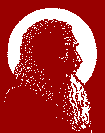 Jacques Maritain Center :
Philosophy of History
Jacques Maritain Center :
Philosophy of HistoryTHE content of the present book is composed of four lectures which I gave in the course of a seminar at the University of Notre Dame in 1955, [and to which I later made a number of additions].
These lectures were recorded on tape; my friend Professor Joseph Evans was good enough to have them transcribed, and then to put them in readable form, trimming the text, inserting here and there answers or free developments which I had indulged in during the discussion, correcting the English style, and at the same time keeping the open conversational tone which is suitable here -- in short, making a book emerge from an informal talk. It is a privilege for a philosopher to have his thought and intentions so perfectly understood. I wish to express my special gratitude to Professor Evans for the extreme care, thoughtfulness and devotion with which he has performed the work of editing. I also wish to tell him how pleased I am to have this book published in collaboration with him.
When Professor Evans sent me the four lectures for revision, I realized that, because of the limitations of time, I had omitted to make in them a certain number of points which I consider important. Thus my revision mostly consisted of writing new pages and affording, or so I hope, further elucidation.
Because of my distrust of Hegel, I was, in my youth, somewhat prejudiced against the very notion of the philosophy of history. Furthermore, as far as my own work is concerned, I have always shunned taking grand and imposing topics as sign-posts for my little essays. As a result, when in a remarkable and exceedingly generous article in the Revue Thomiste,{1} Msgr. Journet entered upon a study of my philosophy of history, I was quite surprised. At least he made me aware of the fact that I had made some incursions into the field, in a more or less scattered manner, according to the opportunities offered by the discussion of other problems. Msgr. Journet's article is an indispensable complement to the present volume. And it was of great assistance to me in the preparation of the lectures from which this book has issued. All the material I needed from my previous essays was collected and set in order there in a most helpful way. I am deeply indebted to Msgr. Journet, not only for this article, but also for the inspiration I received from his great book on the Church, and for his kindness in agreeing to read this book before publication, and to advise me about it.
I wish to express my warm thanks to Reverend Father Bernard I. Mullahy, Vice-Provincial of the Holy Cross Fathers,{2} without whose friendly prodding I would not have chosen this topic for my four lectures in 1955.
I regret that the pressure of time did not permit me to give more extensive developments to the present book, and, in particular, to make use, in my discussion, of the works of Herbert Butterfield, Isaiah Berlin, Christopher Dawson, and P. A. Sorokin, for whom I have special appreciation.
-- JACQUES MARITAIN
The main subjects of my reflections will be as follows:
1) the philosophy of history in general, i.e., from the point of view of the theory of knowledge.
2) axiomatic formulas or functional laws -- I mean those (more universal) formulas or statements which manifest the stability, in the course of history, of certain basic relations or fundamental characteristics.
3) typological formulas or vectorial laws -- I mean those (more particularized) formulas or statements which deal with the very growth of history and the variety of its ages, phases, or aspects, and which manifest such or such typical direction in the historical development.
4) God and history, or rather: God and the mystery of the world.